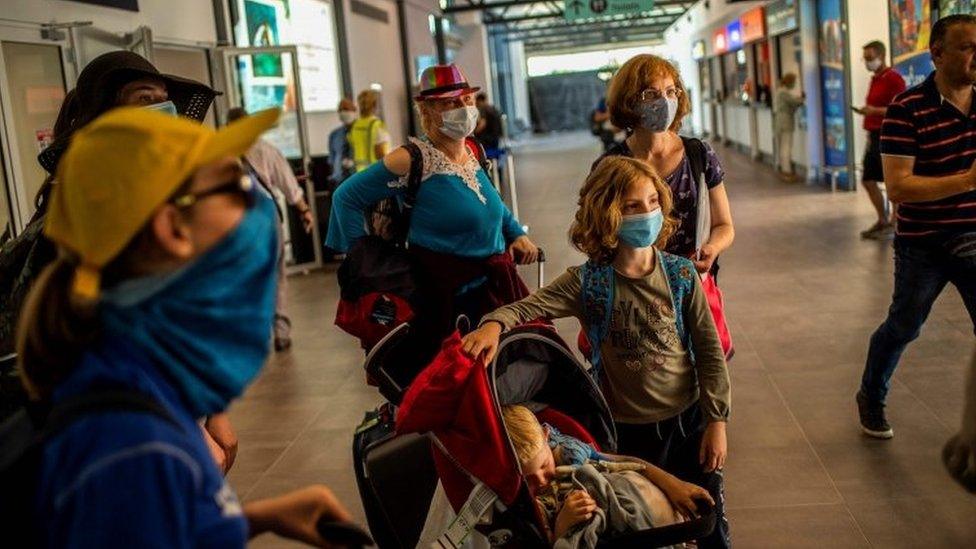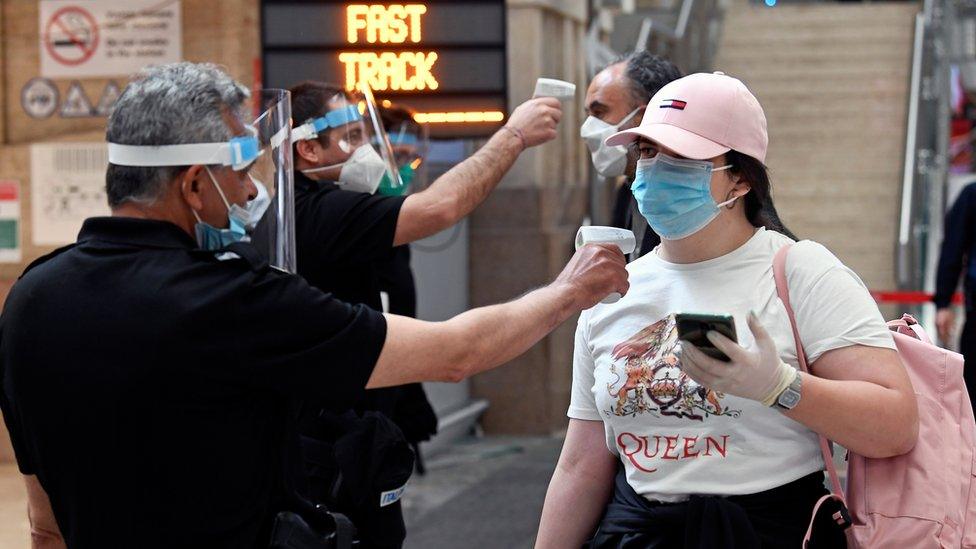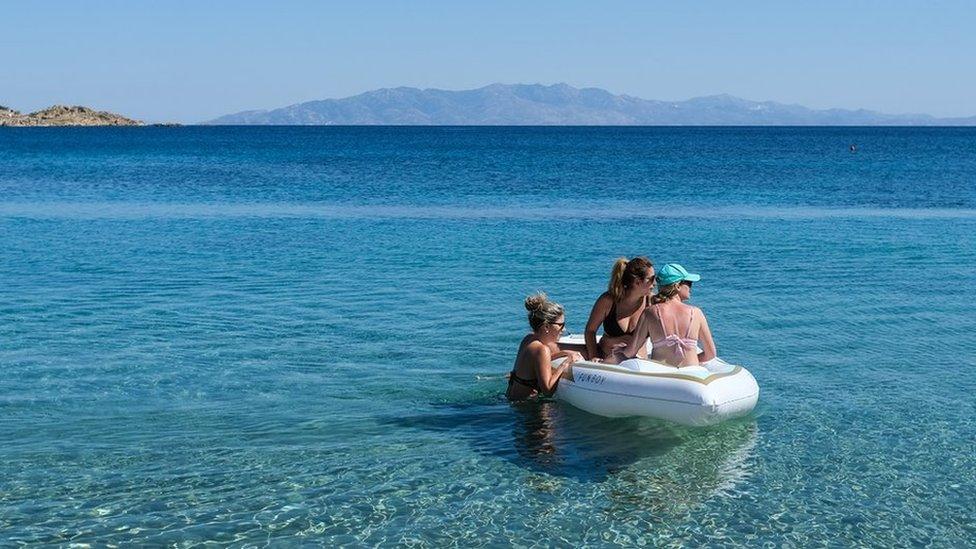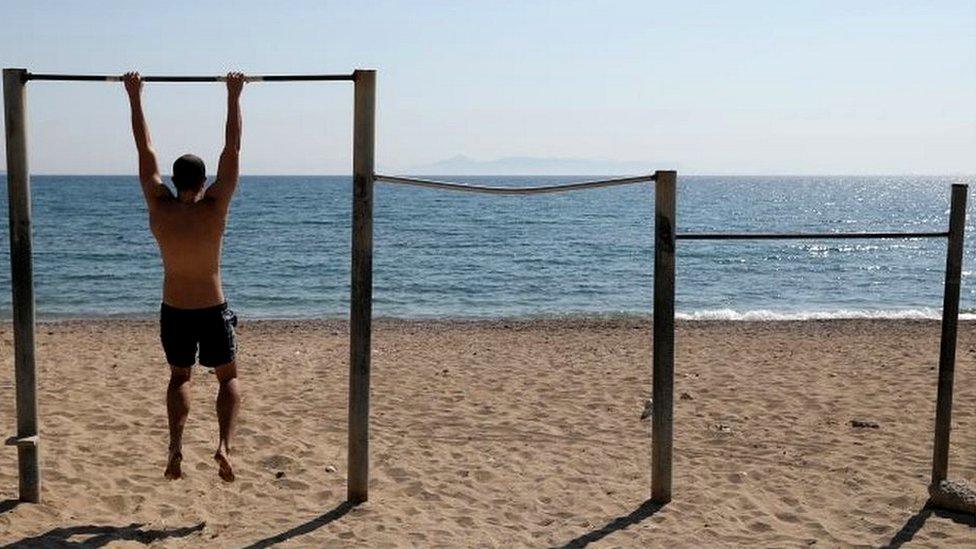Coronavirus: Greece restarts tourist flights as Europe reopens further
- Published

International travellers began arriving in Greece on Wednesday morning
Greece has reopened its borders to some foreign travellers, as European nations further ease their lockdowns.
There are no restrictions on European travellers except those from Sweden and the UK, who cannot fly to Greece until 15 July.
The move comes as the European Union reopens its external borders to a "safe travel" list of nations.
But that group currently excludes the US, Brazil and Russia, where Covid-19 infection rates remain high.
Wednesday 1 July is a key date for several European countries as governments across the continent further ease lockdown measures brought in to contain the spread of the coronavirus in March:
Spain and Portugal reopen their mutual border for the first time in months on Wednesday. Leaders from the two nations, including the Spanish king and Portuguese president, gathered at the crossing points to mark the occasion
Belgium moves into phase four of its lockdown easing, with cinemas, casinos and concerts opening their doors and the social bubbles expanding from 10 to 15 people
The Netherlands and Austria also both lift more restrictions, with brothels allowed to reopen in both countries
Read more about how Europe is lifting its lockdown
The pandemic, however, is far from over in Europe. Local outbreaks have brought the return of lockdowns in Germany, Spain and Portugal, while several Balkan countries are also experiencing a significant rise in cases.
What's happening in Greece?
International airports and ports are opening up to tourists, including ferries from Italy.
Those arriving from abroad must fill out a mandatory form 48 hours before departure explaining where they came from and where they will be staying on arrival. Authorities are also conducting swab tests for arrivals.
The BBC's Quentin Sommerville arrived in Athens airport in May to see how Greece tested travellers
Some 104 flights are expected at Greek regional airports on Wednesday, including popular island destinations like Corfu, Kos and Rhodes.
The Mediterranean country has suffered comparatively few infections and deaths during the pandemic. It has reported 3,409 confirmed cases and a death toll of 192, according to Johns Hopkins University.
Tourism, however, accounts for roughly a quarter of the country's economy, and authorities want to bring back visitors while keeping the population safe.
Prime Minister Kyriakos Mitsotakis thanked his cabinet on Tuesday for reopening Greece to visitors "without compromising on security and public health". But he also warned that the country should prepare for a "very difficult tourist season".
What about elsewhere?
Lockdown measures brought in to contain the spread of the outbreak have eased significantly in recent weeks, with more restrictions ending through the month of July.
But the World Health Organization (WHO) warned on Thursday that Europe had seen a rise in weekly cases for the first time in months.
Health systems could be "pushed to the brink" in certain countries where there had been a "very significant resurgence", WHO regional director Dr Hans Henri Kluge said.
Officials are balancing protecting public health with the need to reopen their economies.
EU member states are not legally obliged to comply with the "safe travel" list, for example, and the European Council plans to revise the list depending on whether infections rise or fall.
The BBC revisits Lombardy, the site of Europe's first major outbreak of coronavirus to ask what went wrong
Italy - which has one of the highest death tolls worldwide - has announced it will maintain quarantine rules for people arriving from outside the Schengen area.
"We must prevent the sacrifices made by Italians in recent months being in vain," Health Minister Roberto Speranza said.
The country reopened its borders to EU and Schengen zone countries on 3 June - as well as the UK - and this will not change, Mr Speranza confirmed.
On Wednesday, Austria announced a travel warning for six Balkan countries which have seen a rise in infections - including Serbia and Montenegro, two countries currently on the EU approved list.
Allow X content?
This article contains content provided by X. We ask for your permission before anything is loaded, as they may be using cookies and other technologies. You may want to read X’s cookie policy, external and privacy policy, external before accepting. To view this content choose ‘accept and continue’.

- Published25 June 2020

- Published19 June 2020

- Published19 June 2020

- Published14 June 2020

- Published4 May 2020
